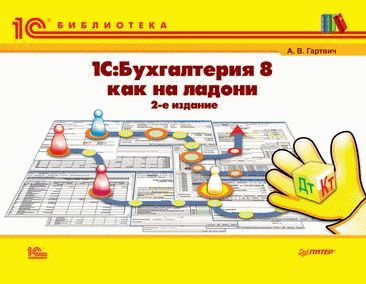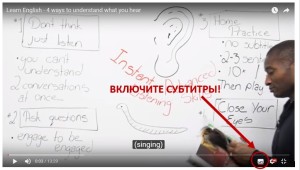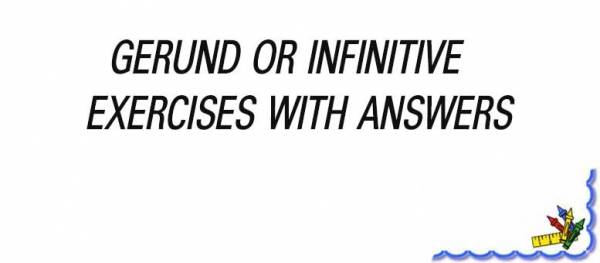
СОДЕРЖАНИЕ
- 1 Infinitive or gerund. Упражнения с ответами
- 2 Infinitive or gerund exercises.
- 3 Упражнения «Герундий и инфинитив» (с ответами)
- 4 Герундий и инфинитив в английском языке
- 5 Инфинитив и герундий в английском языке: правило
- 6 1. Нужно запомнить: инфинитив и герундий, список глаголов
- 7 2. Глаголы, после которых употребляется и инфинитив, и герундий
- 8 3. Еще несколько моментов: герундий и инфинитив в английском
- 9 Подведем итоги: употребление инфинитива и герундия
- 10 Инфинитив и герундий в английском языке: упражнения
- 11 Заключение: инфинитив и герундий
- 12 5 заданий на говорение с использованием Gerunds and Infinitives
- 13 Тренажеры по английскому. Перефразирование. gerund/infinitive
- 14 Тест на инфинитив и герундий
- 15 Инфинитив и -ing форма глагола. Упражнения
- 16 Exercise 1. Поставьте глаголы в скобках в правильную форму (-ing форма (герундий)) или инфинитив (с или без to).
- 17 Exercise 2. Поставьте глаголы в скобках в правильную форму (-ing форма (герундий)) или инфинитив (с или без to).
- 18 Exercise 3. Поставьте глаголы в скобках в правильную форму (-ing форма (герундий)) или инфинитив (с или без to).
- 19 Exercise 4. Поставьте глаголы в скобках в правильную форму (-ing форма (герундий)) или инфинитив (с или без to).
- 20 Комплект упражнений на употребление герундия и инфинитива.
Infinitive or gerund. Упражнения с ответами

Кстати, если Вы не уверены в том, что можете правильно добавить окончание –ing к глаголу – прочтите статью Ing-form. Participle I: как образовать правильно?
Infinitive or gerund exercises.
Упражнение 1. Complete the sentences with the expression get a good job. Use the Infinitive or the -ing form of the verb get.
- I want _________________________.
- I suggest _________________________.
- I dec >
Упражнение 2. Tick the correct item.
1 Greg enjoys … in the rain.
□ walk □ walking □ to walk
- I’d like … Molly an e-mail now.
□ send □sending □ to send
□ do □ doing □ to do
- The cold coach watched his team … football.
□ play □ playing □ to play
- I prefer … detective stories.
□ read □ reading □ to read
- Would you like something …?
□ drink □ drinking □ to drink
Упражнение 3. Use Infinitive or -ing form.
- It was quite late when they saw Martin … (come) up the other side of the street. They saw him … (pause) in front of his house, … (look) up at it and … (knock) at the door.
- My parents let me (stay) at Molly’s house last weekend. They agreed … (take) me to his place in the car and they made me (promise) to behave myself.
- Mel hates (answer) the phone. And very often Mel just lets it … (ring).
- At first Jenny enjoyed … (listen) to Steven but after a while she got tired of … (hear) the same story.
- Polly can’t (go) to the cinema today. She’s busy … (study) for her exam, which is next week, but she’s decided … (take) a break and … (phone) Megan.
- I tried … (listen) carefully and in order (not/show) how I was embarrassed, I did my best … (keep) the conversation … (go) on one topic and another.
Упражнение 4. Прочитайте предложения. Выберите один из предложенных вариантов ответа.
- Peace activist Baroness Bertha von Suttner encouraged Alfred Nobel . a prize for peace. (establish / to establish / establishing / to be established)
- The police officer made Neil get out of the car and demanded … his driver’s licence.(see / seeing / to see / to be seen)
- In the time of Peter the Great the noblemen were not allowed … beards. (have / to have / having / having had)
- They wouldn’t let . the country without the entry visa, would they? (him to enter / he enters / him enter / him entering)
- Fred couldn’t make … that he had caught the huge fish himself. (I believed/ me believe / me believed / me to believe)
- Nick was very close to the phone-box and Mary noticed him … the number, and then she heard him . something to passer-by. (to dial, to say / dialing, to say / to dial, say / dial, say)
- Nick was seen . the hall and then Jane watched him . (enter, go away / be entered, to go away / enter, go away / to have entered, to be gone away)
- It’s too late now, but I will always regret . John to do the work. (to ask / asking / ask / to be asked)
- My friend Moira stopped . whole milk because she is on a diet. (to buy / buying / buy / to be bought)
- They were allowed. discussing the plans, so their partner introduced himself and went on to talk about the project. (to continue / continuing / continue / to be continued)
Упражнение 5 Put one of the given verbs in the correct form – infinitive or gerund:
to see, to lock, to explain, to go, to show, to play, to listen, to do, to write, to earn, to discuss, to drive, to look, to speak, to understand, to do, to stay, to work, to spend
- I wish . the manager.— It’s no use . to him.
- Don’t forget . the door before . to bed.
- My mother told me not . to anyone about it.
- He tried . but she didn’t want .
- Would you mind . me how the lift works?
- I’m beginning . what you mean.
- The boys like . tennis but not . this in bad weather.
- Try . this correctly.
- He likes . in his cabinet.
- I prefer . my car myself.
- I advise you . at my place and . for a new flat.
- Let’s . this tomorrow, I’m tired now.
- Most people prefer . money. Some don’t want . them.
Упражнение 6. Complete the sentences using either the Infinitive or Gerund. Insert prepositions if necessary. Раскройте скобки, употребив герундий или инфинитив (с или без частицы to). Если нужно, вставьте предлог
- He used . (think) that life ended at 40, but now when he’s 41, he knows it’s not true.
- . (make) such a terrible noise!
- It’s five in the morning. I’m not used . (get) up this early,
- It’s impossible. (cut) with this knife. It’s blunt.
- My father enjoys . (listen) to jazz music.
- I’m sorry. (hear) that your mother isn’t well.
- Harry looked so funny that I couldn’t help . (laugh).
- I couldn’t help them . (find) what they were looking for as I was in too much of a hurry.
- I’d like. (cook) something special when guests come.
- What do you feel like. (do) tonight?
- My dad promised . (buy) me a bike if I passed my exams well.
- I hate. (wait) in queues. It really annoys me.
- I looked forward . (see) you again soon.
- It’s difficult . (concentrate) when there’s loud playing on the radio.
- We stopped for a while . (admire) the scenery.
- He can’t afford . (hire) a taxi every day.
- Is it worth . (run) such an awful risk?
- Would you mind . (fetch) another chair?
- I offered . (pay) for the meal, but she refused.
- I’m sorry. (disturb) you, but could you tell me the time?
- My younger sister can’t stop. (eat) sweets.
- He dislikes. (spend) money on car repairs.
- I remember. (go) to Venice as a child.
- . (call) Mike
- I suggested . (call) a taxi so we wouldn’t be late.
- I can’t stand . (wait) in queues.
- There used to . (be) a cinema in our village but it closed down three years ago.
- He is Spanish so he’s used . (drive) on the right.
- Did you remember . (send) your sister a card? It’s her birthday today.
- Have you tried . (read) a book to help you to sleep?
- Nowadays I’m used. (go) to bed early.
- He’ll never forget . (see) the Grand Canyon for the first time.
- He offered . (drive) me to the airport.
- I’ll stop . (lend) you money if you waste it on cigarettes.
- Maya stopped . (tie) her shoelace.
- John suggested . (go) together in one car.
- Will you stop . (make) so much noise, boys?
- It’s difficult to get used . (sleep) in a tent after having a soft, comfortable bed to lie on.
- Linda offered . (look after) my cat while I was out of town.
- Could you please stop. (whistle)! I’m trying . (concentrate) on my work.
Переходим к ответам на упражнения по герундию и инфинитиву.
ОТВЕТЫ
Exercise 1.
To get a good job – 1, 3, 5, 7, 8, 10, 11
Getting a good job – 2, 4, 6, 9, 12
Exercise 2.
1 walking; 2 to send, 3 to do; 4 playing; 5 reading; 6 to drink
Exercise 3.
- come, pause, look, knock 2. stay, to take, promise 3. answering, ring 4. listening, hearing 5, go, studying, to take, to phone 6 to listen, not to show, to keep, going.
Exercise 4.
1 to establish, 2 to see, 3 to have, 4 him enter, 5 me believe, 6 dial, say, 7 enter, 8 go away, 9 asking, 10 to continue
Exercise 5.
1 to see / writing , 2 to lock / going, 3 to speak / to listen, 4 to explain / to listen, 5 showing, 6 to understand, 7 to play (playing) / to do 8 to do, 9 to work или working , 10 to drive или driving 11 to stay / to look 12 discuss 13 to earn (earning) / to spend или to spend (spending) / to earn.
Exercise 6.
1 to think, 2 making, 3 to getting, 4 to cut, 5 listening, 6 to hear, 7 laughing, 8 find, 9 to cook, 10 doing, 11 to buy, 12 waiting, 13 to seeing, 14 to concentrate, 15 to admire, 16 to hire, 17 running, 18 fetching, 19 to pay, 20 to disturb, 21 eating, 22 spending, 23 going, 24 to call, 25 calling, 26 waiting, 27 be, 28 to driving, 29 to send, 30 reading, 31 to going, 32 seeing, 33 to drive, 34 lending, 35 to tie, 36 going, 37 making, 38 to sleeping, 39 to look after, 40 whistling / to concentrate
Надеюсь, вам понравились эти упражнения на герундий и инфинитив
Понравилось? Сохраните на будущее и поделитесь с друзьями!
11 Комментариев для «Infinitive or gerund. Упражнения с ответами»
Ing-form. Participle I: как образовать правильно?
Read more at:ссылочки нет для перехода, но я нашла )) по поисковику, а было бы удjбнее сразу. Спасибо за Ваш ресурс!
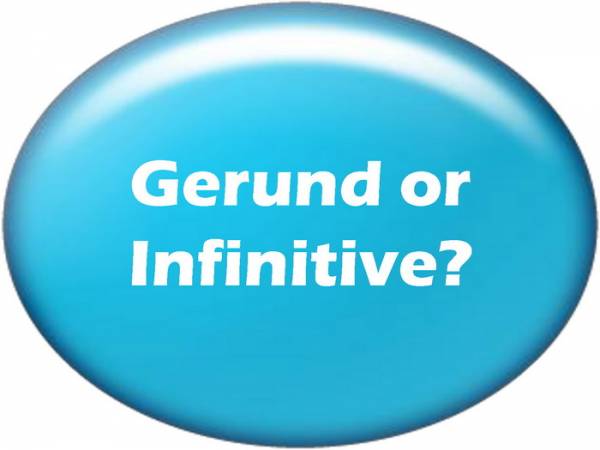
Упражнения «Герундий и инфинитив» (с ответами)

1. Выберите из скобок герундий или инфинитив.
- I am planning … (to visit/visiting) my granny next week. (Я планирую навестить бабулю на следующей неделе.)
- When they finish … (to eat/eating) their lunch, they’ll go to the office. (Когда они закончат обедать, они отправятся в офис.)
- He suggested … (to buy/buying) some food. (Он предложил купить немного продуктов.)
- Does Sally enjoy … (to go/going) to the gym? (Сэлли нравится ходить в тренажерный зал?)
- Don’t put off … (to write/writing) a report till the end of the month. (Не откладывай написание доклада до конца месяца.)
- John refused … (to answer/answering) my question. (Джон отказался отвечать на мой вопрос.)
- My brother intends … (to get/getting) married soon. (Мой брат намеревается скоро жениться.)
- I think she didn’t mean … (to hurt/hurting) you. (Думаю, она не хотела обидеть тебя.)
- Keep … (to beat/beating) the eggs. (Продолжай взбивать яйца.)
- Fred can’t afford … (to travel/travelling) this year. (Фред не может себе позволить в этом году путешествовать.)
- We expect … (to leave/leaving) tomorrow. (Мы собираемся уехать завтра.)
- Mary decided … (to fly/flying) to Venice. (Мэри решила полететь в Венецию.)
- The sportsmen hope … (to get/getting) the best results. (Спортсмены надеются добиться лучших результатов.)
- Are you going to give up … (to smoke/smoking)? (Ты собираешься бросать курить?)
- They don’t want … (to have/having) any more children. (Они больше не хотят иметь детей.)
- I don’t mind … (to wash up/washing up). (Я не против того, чтобы помыть посуду.)
- Girls, stop … (to giggle/giggling). (Девочки, перестаньте хихикать.)
- Ben likes … (to play/playing) chess. (Бен любит играть в шахматы.)
- Lara goes … (to dance/dancing) every weekend. (Лара ходит на танцы каждые выходные.)
- Harry can’t stand … (to work/working) on Saturdays. (Гарри не выносит работы по субботам.)
2. Выберите инфинитив с частицей to или без нее.
- We can … (speak/to speak) Spanish. ( Мы умеем говорить по-испански.)
- He often makes me … (feel/to feel) guilty. (Он часто заставляет меня чувствовать виноватой.)
- You have … (be/to be) friendly and polite. (Ты должен быть дружелюбным и вежливым.)
- She must … (stay/to stay). (Она обязана остаться.)
- The lawyer will … (call/to call) you later. (Юрист позвонит вам позже.)
- I’d like … (send/to send) him a present. (Я бы хотела послать ему подарок.)
- You’d better … (move/to move) faster. (Тебе лучше двигаться быстрее.)
- We heard somebody … (enter/to enter) the apartment. (Мы слышали, как кто-то вошел в квартиру.)
- Mother wants … (paint/to paint) the walls in the kitchen. (Мама хочет покрасить стены на кухне.)
- We decided … (sell/to sell) the car. (Мы решили продать машину.)
- He always fails … (keep/to keep) his word. (Он всегда не сдерживает слово.)
- I am trying … (lift/to lift) this heavy stone. (Я пытаюсь поднять этот тяжелый камень.)
- Let me … (give/to give) you some advice. (Позволь мне дать тебе совет.)
- It may … (cost/to cost) too much. (Это может стоить слишком много.)
- She saw him … (cross/to cross) the street. (Она видела, как он переходит улицу.)
3. Составьте предложения, выбрав начало из первого столбца и окончание – из второго.
- She is interested a) drinking alcohol.
- I would like b) to seeing my daughter.
- You should give up c) being ill.
- We really enjoy d) laughing at her.
- I’m looking forward e) to living in a dirty house.
- He is used f) talking to drunk people.
- She pretended g) swimming in the sea.
- Pamela is good h) to have a cup of coffee.
- I couldn’t help i) in surfing the Internet.
- She avoids j) at riding a horse.
- to visit
- eating
- buying
- going
- writing
- to answer
- to get
- to hurt
- beating
- to travel
- to leave
- to fly
- to get
- smoking
- to have
- washing up
- giggling
- playing
- dancing
- working
1 – i (Ее интересует проведение времени в интернете.)
2 – h (Я бы хотел выпить чашку кофе.)
3 – a (Тебе нужно бросить употреблять алкоголь.)
4 – g (Нам очень нравится плавать в море.)
5 – b (С нетерпением жду встречи с дочкой.)
6 – e (Он привык жить в грязном доме.)
7 – c (Она притворилась больной.)
8 – j (У Памелы есть способности к езде верхом на лошади.)
9 – d (Я не мог не смеяться над ней.)
10 – f (Она избегает разговоров с пьяными.)
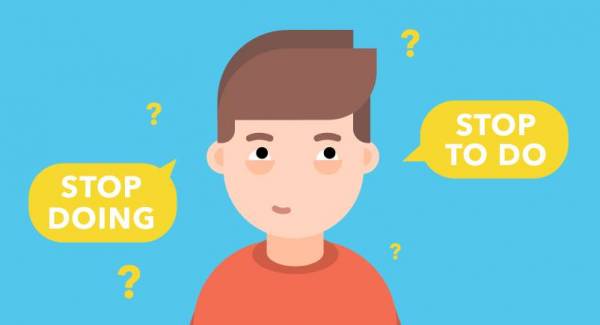
Герундий и инфинитив в английском языке
ykaneva 2018-02-16T13:09:08+00:00 January 30th, 2018 | Практика английского | 17 Comments 17 321,597
Продолжаем разбираться с наиболее сложными частями речи в английском. Мы уже обсудили причастия и герундий. И договорились сравнить герундий с инфинитивом в английском языке.

Из прошлой статьи ты помнишь, что герундий – нечто среднее между глаголом и существительным: reading – чтение, leaving – отъезд.
Герундий может быть любым членом предложения, в том числе дополнением. И сегодня мы подробно поговорим именно про эту функцию. Дополнение – член предложения, который дополняет действие и отвечает на вопросы косвенных падежей: чего? чему? чем? что? о чём?
Пример дополнения-существительного в русском:
Я планирую (что?) переезд;
Я думаю (о чем?) о переезде.
Пример дополнения-герундия в английском:
I’m tired of waiting. – Я устал (от чего?) от ожидания.
I appreciate being polite to seniors. – Я ценю (что?) вежливое отношение к пожилым.
Инфинитив и герундий в английском языке: правило
Так вот дополнением может быть и инфинитив. Это касается и русского, и английского языка. Инфинитив – это начальная форма глагола.
В русском языке он отвечает на вопросы: что делать? что сделать?
В английском языке – это форма глагола с частицей to (иногда частица может опускаться).
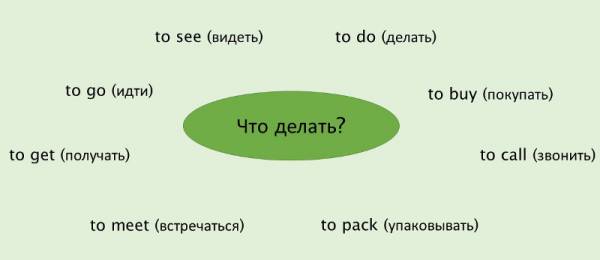
Пример дополнения-инфинитива в русском:
Игорь попросил сестру (о чем?) помочь ему.
Я заставил его (что?) ответить.
Пример дополнения-инфинитива в английском:
She agreed to come back later. – Она согласилась (на что?) вернуться позже.
He asked to change the ticket. – Он попросил (о чем?) поменять билет.
Вытекает вопрос: как определить, когда в качестве дополнения нужен инфинитив, а когда – герундий? Давай разбираться.
1. Нужно запомнить: инфинитив и герундий, список глаголов
Начнем с несложного: с одними глаголами принято использовать герундий, а с другими – инфинитив. Вот и все. Нужно просто запомнить эти глаголы.
⠀
Глаголы, после которых употребляется герундий
| ⠀Глагол | ⠀Пример |
| ⠀to admit (признаться) | ⠀He admitted committing the crime. ⠀Он признался в совершении преступления. |
| ⠀to appreciate (ценить) | ⠀I appreciate being polite to seniors. ⠀Я ценю вежливое отношение к пожилым людям. |
| ⠀to avoid (избегать) | ⠀Please, avoid speeding! ⠀Пожалуйста, не превышай скорость! (=избегай превышения) |
| ⠀to consider (рассматривать) | ⠀They consider travelling without children. ⠀Они думают о путешествии без детей. |
| ⠀to delay (откладывать) | ⠀He delayed visiting a doctor. ⠀Он откладывал визит к врачу. |
| ⠀to deny (отвергать) | ⠀They denied selling the house. ⠀Они отказались продавать дом. |
| ⠀to keep (держать, хранить) | ⠀He kept asking silly questions. ⠀Он продолжал задавать глупые вопросы. |
| ⠀to miss (скучать) | ⠀She misses living with her parents. ⠀Она скучает по тому времени, когда жила с родителями.⠀⠀⠀⠀⠀⠀ |
| ⠀to suggest (предлагать) | ⠀They suggested moving to another town. ⠀Они предложили переехать в другой город. |
| ⠀to quit (бросать) | ⠀He quits working. ⠀Он бросает работу. |
| ⠀to finish (заканчивать) | ⠀We finished renovating our flat. ⠀Мы закончили ремонтировать квартиру. |
| ⠀to practise (практиковать) | ⠀He needs to practise reading before the exam. ⠀Ему нужно практиковаться в чтении перед экзаменом. |
| ⠀to imagine (представлять) | ⠀A girl imagines being a princess. ⠀Девочка представляет, что она принцесса. |
| ⠀to risk (рисковать) | ⠀You risk getting a bad mark. ⠀Ты рискуешь получить плохую оценку. |
| ⠀to mind (возражать) | ⠀Do you mind opening the window? ⠀Ты не мог бы открыть окно? |
| ⠀to enjoy (наслаждаться) | ⠀He enjoys swimming in the sea. ⠀Он наслаждается купанием в море. |
⠀
Герундий также используется после глагола go, если речь идёт о каком-то времяпрепровождении, активных занятиях: Let’s go swimming!
Герундий часто используется после фразовых глаголов, например: to look forward to, to give up, to put off и др.
⠀
Список глаголов с инфинитивом
| ⠀Глагол | ⠀Пример |
| to agree (соглашаться) | She agreed to come back later. Она согласилась вернуться позже. |
| to appear (казаться) | He appeared to be a decent person. Он казался порядочным человеком. |
| to be able (быть способным) | I won’t be able to make it. Я не смогу это сделать. |
| to can afford (мочь себе позволить) | We can’t afford to travel more than once a year. Мы не можем себе позволить путешествовать больше одного раза в год. |
| to choose (выбирать) | She chose to enter a university. Она выбрала поступление в университет. |
| to decide (решать) | They decided to start up their own business. Они решили начать свой собственный бизнес. |
| to expect (ожидать) | I expected them to call. Я ожидала от них звонка. |
| to hope (надеяться) | They hoped to get a loan. Они надеялись на получение кредита. |
| to learn (учить) | Mary learnt to swim when she was at a summer camp. Мэри научилась плавать, когда была в летнем лагере. |
| to manage (суметь) | He managed to escape from the police. Он смог ускользнуть от полиции. |
| to offer (предлагать) | A manager offered to change the soup when I saw a fly in it. Менеджер предложил поменять суп, когда я увидел в нём муху. |
| to plan (планировать) | I plan to start learning Italian soon. Я собираюсь начать учить итальянский скоро. |
| to prepare (готовиться) | She prepared to welcome her new relatives. Она приготовилась приветствовать своих новых родственников. |
| to pretend (притворяться) | He pretended not to see me to avoid an awkward situation. Он притворился, что не видит меня, чтобы избежать неловкой ситуации. |
| to promise (обещать) | Jack promised not to beat other children at school. Джек пообещал не бить других детей в школе. |
| to refuse (отказаться) | A student refused to retake a test. Ученик не согласился пересдавать контрольную. |
| to seem (казаться) | She seems to care a lot about her health. Кажется, она очень заботится о своём здоровье. |
| to tend (иметь тендецию) | Prices tend to rise these days. Цены имеют тенденцию к росту в последнее время. |
| to want (хотеть) | He wants to find out more about special offers. Он хочет узнать больше о специальных предложениях. |
| to would like, would prefer, would love (предпочитать) | I would like to get some information about your services. Я бы хотел получить информацию о ваших услугах. |
⠀
Чтобы все эти случаи «отложились в подкорке», советуем периодически проходить нашу грамматическую тренировку: Infinitive and Gerund.
2. Глаголы, после которых употребляется и инфинитив, и герундий
Следующий пункт посложнее: есть глаголы, после которых можно использовать и герундий, и инфинитив.
Что тут сложного? Дело в том, что часть этих глаголов будет менять значение в зависимости от того, в чьей компании они находятся – в компании герундия или инфинитива.
⠀
Глаголы, которые меняют значение: таблица герундия и инфинитива в английском языке
remember doing = помнить что-то. ⠀⠀⠀⠀⠀⠀⠀⠀⠀⠀⠀⠀⠀⠀⠀⠀⠀⠀⠀⠀⠀⠀⠀⠀
I remember leaving my cell phone on the table. (Я точно помню, что оставил телефон на столе)
remember to do = вспомнить, не забыть. ⠀⠀⠀⠀⠀⠀⠀⠀⠀⠀⠀⠀⠀⠀⠀⠀⠀⠀⠀⠀⠀⠀⠀⠀⠀⠀⠀⠀⠀⠀⠀⠀⠀⠀
Remember to take your keys before you go out. (Не забудь взять свои ключи перед тем, как пойдешь на работу).
forget doing = забыть/не иметь сил забыть о чем-то, что уже произошло.
I will never forget meeting her. It changed all my life! (Я никогда не забуду…)
forget to do = забыть что-то сделать в настоящем или недалеком прошлом.
I think I forgot to turn off the iron. (Мне кажется, я забыла выключить…)
regret doing = пожалеть о чем-либо, что уже произошло.
I regret talking to her that way! (Я сожалею, что разговаривал с ней так!)
regret to do = сожалеть о чем-либо, что приходится делать сейчас.
We regret to inform you that you have not been admitted to Johns Hopkins University. (С сожалением сообщаем, вынуждены сообщить…)
stop doing = совсем прекратить что-то делать.
I finally stopped eating at night! (Наконец-то я перестала есть по ночам!)
stop to do = прекратить одно действие, чтобы начать делать что-то другое.
He stopped to ask for directions. (Он остановился, чтобы спросить дорогу)
go on doing = продолжать делать что-то, одно и то же действие.
After a break she went on talking about her health. (После перерыва она продолжила рассказывать о своём здоровье)
go on to do = продолжать, но переключиться с одного действия на другое.
She, first, melted chocolate, added butter and then went on to make icing. (Она сначала растопила шоколад, добавила масло и продолжила делать глазурь)
try doing = попробовать что-то сделать, в качестве эксперимента.
She tried learning English but gave up after a while. (Она попробовала поучить английский, но бросила через некоторое время).
try to do = пытаться совершить сложное действие, стараться, и прилагать значительные усилия.
I tried to work, but couldn’t because of a terrible headache. (Я попытался поработать, но из-за ужасной головной боли я не смог).
⠀
Глаголы, которые не меняют значение
Есть и другие глаголы, которые тоже употребляются и с герундием, и с инфинитивом. Но они смысл значительно не меняют: begin, continue, prefer, start, hate, love, like.
She begins sneezing every time she sees a cat.
She begins to sneeze every time she sees a cat.
(Она начинает чихать каждый раз, когда видит кошку).
После глаголов advise, allow, recommend, encourage, permit тоже можно использовать и герундий, и инфинитив. НО! Если после основного глагола стоит объект (на кого направлено действие), то используем инфинитив:
Mum allowed me to stay overnight at my friend’s place. (Мама разрешила мне заночевать у подруги).

Если объекта нет, то используем герундий:
Mum allowed staying overnight at my friend’s place. (Мама разрешила ночевку у подруги).
3. Еще несколько моментов: герундий и инфинитив в английском
Есть еще несколько случаев употребления герундия и инфинитива, которые стоит запомнить.
⠀
Герундий: примеры предложений
– После предлогов.
Если после глагола стоит предлог, то мы используем герундий. Это предлоги: for, before, without, by, about, of, from, in.
I’m interested in drawing. – Я интересуюсь рисованием.
⠀
Употребление инфинитива в английском
– После прилагательных во фразах типа: It is good (important, happy, hard и т.д.) to…
It is nice to see you again. – Радостно видеть тебя снова.
– С вопросительными словами в утверждениях.
I don’t know how to open this door. – Я не знаю, как открыть эту дверь.
– Для выражения цели какого-то действия.
I came here to meet you. – Я пришел сюда, (зачем?) чтобы встретиться с тобой (правда, это уже не дополнение, а обстоятельство).
Подведем итоги: употребление инфинитива и герундия
– Герундий – это что-то среднее между глаголом и существительным. Инфинитив – это начальная форма глагола, которая отвечает на вопрос «что делать?».
– Инфинитив и герундий могут быть дополнением в предложении, тогда они ставятся после основного глагола.
– Есть глаголы, после которых всегда ставится герундий: admit, avoid, consider и др. Их нужно просто запомнить.
– После других глаголов всегда ставится инфинитив: agree, choose, decide и т.д. Их тоже надо запомнить.
– Еще одна группа глаголов – те, после которых может быть и инфинитив, и герундий, при этом будет меняться смысл самого глагола: remember, forget, stop и др.
– На нашу радость есть и глаголы, после которых можно использовать обе формы глагола без значительного ущерба для смысла: love, hate, begin и др.
Инфинитив и герундий в английском языке: упражнения
Да, информации много, и просто зазубрить её не получится. Нужно много практики, которую мы тебе с удовольствием предоставим.
Для начала пройди 12 уроков Gerund and Infinitive в нашем грамматическом курсе. Из него ты узнаешь про Complex Object (сложное дополнение), на котором я не стала останавливаться сегодня, и еще несколько нюансов использования инфинитива и герундия.

А потом периодически прогоняй грамматическую тренировку, чтобы довести выбор нужной формы до автоматизма.
Заключение: инфинитив и герундий
На сегодня все. В следующем месяце в рамках этого грамматического цикла статей мы с тобой обсудим еще одну загадочную сущность – отглагольное существительное. Сравним его с уже знакомым и родным герундием. До встречи!

5 заданий на говорение с использованием Gerunds and Infinitives


В рубрике «Упражнения» мы предлагаем вам короткие задания-ситуации для закрепления грамматических структур в говорении. Сегодня на очереди Gerunds and Infinitives.
Употребление Verb patterns не всегда даётся легко студентам независимо от их уровня. Задача преподавателя — помочь студенту разобраться, в каких случаях употребляется инфинитив, а в каких герундий.
Pairs: Gerunds and Infinitives
Уровни – pre-intermediate – upper-intermediate

Цель – запомнить, какие глаголы употребляются с ing и с to, облегчить запоминание путем классификации глаголов по группам.
Студенту даются перевернутые карточки с глаголами, после которых употребляется ing, to или без to. Нужно по памяти открыть глаголы определенной группы и тогда они исчезают. Например, want и would like близки по значению и после них употребляется Infinitive. Студент может составить предложение о себе с одним из этих глаголов, а преподаватель должен угадать правда это или нет.
Создать эту игру в онлайне можно создать, используя сервисы. Пример для уровня pre-intermediate.
Personality quiz: Gerunds and Infinitives
Уровни – pre-intermediate – upper-intermediate

Студенты любят говорить о себе, поэтому можно предложить им заполнить анкету перед собеседованием, а затем её обсудить. При заполнении пропусков студентам следует нужно выбрать, какие формы употреблять: герундий или инфинитив.
Задание для студента
You are at the job interview. Complete this job personality quiz
Name:________
I enjoy working with others
I expect to make a lot of money
I decided______ this job because______
I’m good at_______
I’m willing______
I dislike________
I never complain about_______
I plan________ next year
I dream about________
I can’t stand______
I enjoy_______
I expect people ______
Преподаватель играет роль HR менеджера и уточняет полученную информацию: You are willing to learn new skills, aren’t you? What skills exactly?
Feelings: Gerunds
Уровни – pre-intermediate – upper-intermediate

Задание для студента:
Make different sentences about yourself using these adjectives:
excited disappointed relaxed angry embarrassed anxious scared pleased
For example: Dancing makes me feel happy because it gives me energy.
Альтернативное упражнение: Sweet memories (taken from Teaching Creatively by Gunter Gerngross)
Цель – употребить герундий в предложениях об опыте, воспоминаниях и чувствах студента.
Преподаватель даёт опорную таблицу для составление предложений.
Listening to
Hearing
Watching
Feeling makes me think of______
Touching bring back memories of_____
Smelling
Tasting
For example, smelling horses makes me think of Western films.
Для уровня Upper можно добавить фразы по теме воспоминания:
I will never forget doing smth
I remember doing smth for the first time
Troubleshooting: Gerunds and Infinitives
Уровни – pre-intermediate – upper-intermediate

Цель – обсудить решение социальных проблем, употребляя фразы с герундием или инфинитивом.
Преподаватель просит студента назвать социальные проблемы,которые существуют и записывает их в столбик:
homeless people
heavy traffic
obesity
drunk driving
Пользуясь опорными фразами назвать несколько решений данных проблем:
We need to educate people about the role of exercise. I’m in favour of offering free meals in the streets.
Useful language:
I support… I advise…. I’m against….. We should stop…..
I suggest… We need…. I recommend…. We should encourage people to….
I’m in favour for… I go along with… I hope….. We have to remind…
Можно использовать узкие темы в зависимости от лексики, которую вы изучили на уроке: Как проводить свободное время? Как правильно питаться? Как защитить окружающую среду?
Guessing game: Gerunds and Infinitives
Уровни – pre-intermediate – upper-intermediate
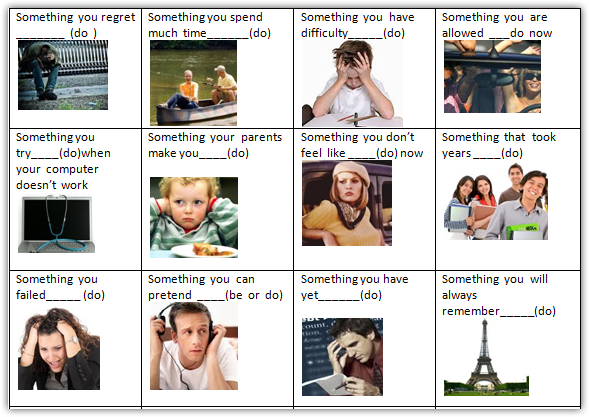
Задание для студента
Choose 3 statements below and write your true answers.
Something you regret doing
Something you have difficulty doing
Something you spend much time doing
Something you failed to do
Something you don’t feel like doing now
Something you weren’t allowed to do when you were a child
For example, ball room dancing, to go to nightclubs, to pass driving test.
Преподаватель догадывается, к какому вопросу относится ответ студента. Чтобы усложнить задание, студент может вначале заполнить пропуски, а затем ответить на вопрос.

Юлия Белоног
Тренажеры по английскому. Перефразирование. gerund/infinitive
Мы не будем подробно останавливаться на этой теме, потому что здесь нет сложных моментов для понимания, в основном – запоминание.
Принцип таков: после определённых слов идёт только G erund (глагольная форма с — ing ) , после других слов – только I nfinitive (неопределённая форма глагола, отвечающая на вопросы что делать, что сделать). Существуют слова, после которых может идти и G erund, и I nfinitive, иногда с небольшой разницей в смысле.
Надо просто их запомнить, проверяя каждое по словарю. Приведём примеры некоторых из них.
Gerund ( 3.1 )
После таких глаголов как enjoy , mind , regret всегда ставится герундий (глагол + ing ).
• I enjoy meet ing people.
Я получаю удовольствие от общения (встреч, знакомств) с людьми.
• Do you mind open ing the window?
Вы не против открыть окно?
Infinitive ( 3.2 )
После глаголов want и decide всегда идёт Infinitive (гл +to) .
• I want to buy a house.
Я хочу купить дом .
• We dec >to go to Hawaii.
Мы решили поехать на Гавайи.
Gerund or Infinitive ( 3.3 )
Да такое может быть, но смысл может поменяться. Приведём примеры где вы можете увидеть эту разницу.
• I tried to take the pills the doctor (had) prescribed.
Я попытался принимать таблетки, которые доктор прописал.
(сделал одну попытку, но по какой-то причине ничего
не вышло: или таблетки были большие, или ещё что-то)
• I tried tak ing the pills the doctor (had) prescribed.
Я пытался принимать таблетки, которые доктор прописал.
(здесь я экспериментировал, делал это несколько раз
в надежде, что они помогут, результат неизвестен:
может быть, помогли, а может быть, нет)
• When we were redecorat ing this room, we tried to move that table.
Когда мы делали косметический ремонт в этой комнате, мы попытались передвинуть этот стол.
(попытались сдвинуть, он был очень тяжелый, у нас ничего не получилось)
• When were redecorat ing this room, we tried mov ing that table.
Когда мы делали косметический ремонт в этой комнате, мы (по)пытались передвинуть этот стол.
(подвигали его туда-сюда, поэкспериментировали, результат неизвестен: может быть, оставили его на старом месте, а может быть, передвинули на новое)
Нет, не всегда. В следующих примерах нет особой разницы в смысле между употреблением G erund или I nfinitive ( 3.4 ). Обычно, когда идет общее утверждение, то после like, love, enjoy, prefer ставится герундий (She likes swimm ing ), а когда есть уточнение ( She likes to sit near the window ) – инфинитив.
• Fedya Sumkin love s travell ing .
Федя Сумкин любит путешествовать.
(общее утверждение)
• Fedya Sumkin love s to travel to India when he’s on vacation.
Федя Сумкин любит ездить (путешествовать) в Индию, когда он на каникулах (в отпуске).

Тест на инфинитив и герундий
Тест на инфинитив и герундий – один из наиболее трудных грамматических тестов. Понятия инфинитива, а особенно герундия, довольно трудно усваиваются, поскольку в русском языке полных аналогов этих категорий нет.
В 10 вопросах теста собраны наиболее типичные случаи употребления разных форм герундия и инфинитива в английском языке. В предложениях теста они представлены в формах Simple, Continuous и Perfect , а так же вам нужно будет выбрать формы активного или пассивного залогов.
При прохождении теста рекомендуем обратить внимание на глаголы, после которых употребляются эти формы.
Онлайн тест на инфинитив и герундий
to hear hear hearing heard
help helping to be helped be helped
Sorry … you in such an uncomfortable situation.
to placing to have placed placing to be placed
I’m so glad … with such a famous person.
speaking to be spoken to be speaking being spoken
This boy seems … a lot.
to read to be read reading read
… to good music is a pleasure.
Listen Listening Listened Being listening
reparing to repare be repaired repaired
All children like … fairy-tales.
tell being told be told be telling
Excuse me for … your favorite cup.
breaking break to break being breaking
I don’t mind … to the party.
she come she coming her coming she to come
Чтобы продолжить тест, выберите один из вариантов ответа.
Вы ответили правильно на
18 вопросов из 20

Упс. Два балла((( Скорее начинайте учить английский язык с онлайн самоучителем Lim English. С ним Вы гарантированно получите результат.
“Удовлетоворительно”. Начинайте учить английский язык с онлайн самоучителем Lim English по уникальной методике Олега Лиманского. Результат не заставит себя ждать!
“Хорошо” Поздравляем! Вы не плохо владеете английским языком в рамках выбранного уровня. Начинайте учить английский язык с онлайн самоучителем Lim-English по уникальной методике Олега Лиманского. С ним Вы гарантированно улучшите свои знания.
Поздравляем! Это отличный результат. Вы прекрасно владеете английским языком в рамках выбранного уровня. У Вас появилась отличная возможность поднять свой уровень с онлайн самоучителем Lim-English. Вы получите ежедневную практику.
Превосходный результат! Вы отлично владеете английским языком в рамках выбранного уровня. Нет предела совершенству, используйте онлайн самоучитель Lim-English — это отличный способ всегда быть в форме. Проверьте свои силы на наших курсах для продвинутых.

Инфинитив и -ing форма глагола. Упражнения

Exercise 1. Поставьте глаголы в скобках в правильную форму (-ing форма (герундий)) или инфинитив (с или без to).
- His mother always tells him (study) hard.
- Does she know how (play) this game?
- You need (say) sorry to your mother.
- Do you fancy (go) out tonight?
- You must (visit) your grandma at hospital.
- I’ve never been to a language camp but I’d like (go) one day.
Answers: 1. to study 2. to play 3. to say 4. going 5. visit 6. to go.
Exercise 2. Поставьте глаголы в скобках в правильную форму (-ing форма (герундий)) или инфинитив (с или без to).

- You should avoid (have) an argument with your mother.
- Let me (stay) up a little longer. I don’t want to come back in empty house.
- The attic needs (paint).
- They didn’t let us (leave) the room.
- She’s not old enough (drive) a car.
- Take a deep breath (feel) better.
- I can’t stand (watch) stupid videos.
- My parents made me (stay) at home.
- Will you help me (repair) this toy?
- It’s not worth (try) to spend your time on him.
- You should (be) very careful when you cross the street.
- He was advised (report) about the accident to the police.
- I canIt wait (tell) you the good news.
- She can’t stand (be/told) lies.
- I don’t mind (help) you with the homework.
Answers: 1. having 2. stay 3. painting 4. leave 5. to drive 6. to feel 7. watching 8. stay 9. repair 10. trying 11. be 12. to report 13. to tell 14. being told 15. helping.
Exercise 3. Поставьте глаголы в скобках в правильную форму (-ing форма (герундий)) или инфинитив (с или без to).

- I’m hungry! How about (order) a pizza?
- I would like (be) a musician when I’m older.
- Her mother made her (tell) where she had been last night.
- It’s to late (apply) for the job. They’ve already found a teacher.
- I love (play) board games with my family.
- He went to the gym without (eat) any dinner.
- It was very unusual for our teacher (shout) like that.
- There’s no point in (do) this.
- I’d love (see) your rabbit!
- Bill keeps (forget) to do his chores.
- You must (go) with her.
- Do you fancy (go) to the cinema now?
Answers: 1. ordering 2. to be 3. tell 4. to apply 5. playing/to play 6. eating 7. to shout 8. doing 9. to see 10. forgetting 11. report 12. going.
Exercise 4. Поставьте глаголы в скобках в правильную форму (-ing форма (герундий)) или инфинитив (с или без to).

- She did’t mean (be) rude. It was just a joke.
- Dieting means (be) very careful about food.
- I remember (put) my wallet in my bag before I left home.
- Did you remember (buy) some milk?
- He went on (type) his report until the morning.
- After Jane had completed her Italian course she went on (improve) her Spanish.
- Why don’t you try (drink) not so much coffee?
- I tried (open) the door but I couldn’t.
- We regret (tell) you that you have not been selected for the team.
- Sam regretted (tell) his best friend lies.
- Children had been playing for quite a while before they stoped (have) dinner.
- She’s been having trouble sleeping lately so she’s (have) coffee in the afternoon.
- I hate (bother) you, but may I ask you to help me?
- I hate (cause) you so much trouble.
- I will never forget (meet) you for the first time.
- Tom forgot (buy) milk.
Answers: 1. to be 2. being 3.putting 4. to buy 5. typing 6. to improve 7. drinking 8. to open 9. to tell 10. telling 11. to have 12. having 13. bothering 14. to cause 15. meeting 16. to buy.

WELL DONE!
Литература:
- Английский язык. 8 класс: учеб. для общеобразоват. организаций/Ю.Е. Ваулина, Д. Дули, Просвещение, 2016.
- Английский язык. 9 класс: учеб. для общеобразоват. организаций/Ю.Е. Ваулина, Д. Дули, Просвещение, 2016.

Комплект упражнений на употребление герундия и инфинитива.
Устанавливая рекомендуемое программное обеспечение вы соглашаетесь
с лицензионным соглашением Яндекс.Браузера и настольного ПО Яндекса .
want plan decide hope expect offer wish promise refuse would like need learn
enjoy mind finish stop suggest keep be worth
like love start begin prefer hate continue
can/could may/might must should shall/will
want wish would like e*pect know like hate advise
see watch hear feel notice
Test 1 V-ing or infinitive? 1. My Mum hates (watch/watching) television. 2. 1 enjoy (read/reading) magazines. 3. 1 can (play/playing) football. 4.My friends like (swim/swimming).5.Tom can’t (do/doing) yoga.6.Do you enjoy (play/playing) sports?7.Can you (play/playing) darts?8.I can’t (cook/cooking).9.My sister likes (listen/listening) to music. 10. My Dad hates (repair/repairing) toys.
Test 2 V-ing or infinitive?
I want (to see/seeing) Tom.
We enjoy (to swim/swimming).
3. 1 would like (to live/living) in a small town.
We decided (to buy/buying) a new house.
You promised (to help/helping) me with my homework.
We stayed in the house until it stopped (to rain/raining).
I don’t really mind (to cook/cooking).
I hope (to visit/visiting) you next week. 9. 1 suggest (to travel/travelling) by train.
10. We need (to learn/learning) English before we go to Great Britain.
Test 3 V-ing or infinitive?
The music is very loud. It’s difficult (to hear/hearing) you.
I hope (to pass/passing) my exam this year.
This book is worth (to read/reading).
4. 1 want (to buy/buying) a new car.
They’d like (to stay/staying) at home this weekend.
This text is very hard (to understand/understanding).
It was lovely (to see/seeing) you again at Ann’s party.
8. 1 enjoy (to write/writing) letters.
9. She decided (to take/taking) this job.
10. The weather was very bad so they stopped (to play/playing) football.
Test 4 Choose the correct form.
1. 1 can you if you like.
a) help b) to help c) helping
I’m not going out until it stops .
a) rain b) to rain c) raining
What do you want tonight?
a) do b) to do c) doing
4. 1 learnt when I was five years old.
a) swim b) to swim c) swimming
Have you finished the kitchen?
a) clean b) to clean c) cleaning
The exam is next month. You must
a) work b) to work c) working
I’m tired. I would like to bed.
a) go b) to go c) going
Do you enjoy other countries?
a) visit b) to visit c) visiting
The weather was nice, so I suggested
for a walk by the river.
a) go b) to go c) going
Where’s Bill? He promised here on
a) be b) to be c) being
Shall I the window?
a) open b) to open c) opening
I’m not in a hurry. I don’t mind .
a) wait b) to wait c) waiting
What have you decided ?
a) do b) to do c) doing
George was angry and refused to me.
a) speak b) to speak c) speaking
You should your granny on Sunday.
a) visit b) to visit c) visiting
Test 5 Choose the correct form.
1. 1 like London but I don’t want there.
a) live b) to live c) living
I’m trying to work. Please stop .
a) talk b) to talk c) talking
Tom hasn’t seen his aunt for a long time. He must her next month.
a) visit b) to visit c) visiting
Linda has a lot of books. She enjoys ______
a) read b) to read c) reading
I’m surprised that you’re here. I didn’t expect you.
a) see b) to see c) seeing
“ Shall we get a taxi to the cinema?”
“ If you like, but it isn’t far. I don’t mind
a) walk b) to walk c) walking
Will they this game?
a) win b) to win c) winning
Julia had a lot to do, so I offered
a) help b) to help c) helping
I’m not interested in .
a) hike b) to hike c) hiking
What shall we do this afternoon? Would you like to the beach?
a) go b) to go c) going
Goodbye! I hope you again soon.
a) see b) to see c) seeing
This film is worth . I liked it very
a) see b) to see c) seeing
Could you your question, please?
repeat b) to repeat c) repeating
I am fond of stamps.
a) collect b) to collect c) collecting
15. The weather was terrible, so we decided at home.
a) stay b) to stay c) staying Test 6
Test 6 Put the verbs in brackets in the correct form (V-ing or infinitive).
Do your parents allow you (go out) with anybody you want?
Just keep (try) and you’ll succeed one day.
Do you enjoy (learn) languages?
She would like (travel) all over the world.
1 think she has a great chance of (win) the competition.
They expect (arrive) at the airport at 6.30.
Do you think she will agree (have) the meeting in her office?
If the phone doesn’t stop (ring), I am going to break it.
When did you start (learn) French?
They hope (go) to the Black Sea next year.
Her brother likes (swim), but he doesn’t like swimming pools.
My sister doesn’t really need (work), but she enjoys (be) around the people.
(Eat) fatty foods, (drink) alcohol and (smoke) are all bad for your health.
Don’t you want (learn) (drive)?
After (work) all day, he doesn’t feel like going out again.
Test 7 Complex object: insert to where necessary.
1 heard the front door open.
1 hate you be late.
Granny watched the children playing.
I want you buy some bread.
Would you like me read this text?
The parents made the boy stay at home.
7. 1 saw a strange man enter the house.
We didn’t expect you come so soon.
Let me explain this rule to you.
They noticed a black dog run into the
The boy watched his mother washing
She likes her children sing.
He doesn’t want his son become an engineer.
I know him be a lazy pupil.
Tom felt somebody touch his shoulder.
Test 8 Complex object: choose the correct form.
Dad wants Dick (making/to make) his bed.
Have you seen Jack (go/to go) out?
«Shall we begin?» «No, let’s (to wait/wait) a few minutes.»
I know him (to be/being) a famous singer.
The teacher watched her pupils (to write/ writing) a dictation.
They made me (to do/do) it.
The teacher wants the students (to read/ read) this text.
We expect John (passing/to pass) his exam.
I heard her (singing/to sing) this wonderful song at the party.
They advised me (to read/read) this book.
Did you notice anyone (come/to come) in?
Would you like him (to join/joining) us?
Did the doctor let him (going/go) out?
Suddenly I felt somebody (to take/take) me by the hand.
What makes you (think/to think) so?
Test 9 Choose the correct form.
1 want you (come/to come) with me.
1 don’t like (cook/cooking).
Have you ever heard her (sing/to sing)?
I don’t mind (getting up/to get up) early.
May I (open/to open) the window?
My father has decided (selling/to sell) his old car.
Brian wasn’t well. I advised him (go/to go) to the doctor.
Paul let me (use/to use) his phone.
1 hate (travelling/travel) alone.
If it’s a nice day tomorrow, I’d like (to have/ having) a picnic by the lake.
She can’t (to speak/speak) French.
I watched my brother (drawing/to draw).
She promised (to come/come) on time.
Have you finished (to do/doing) your homework?
He’s very funny. He makes me (laugh/laughing).
Test 10 Put the verb in brackets in the correct form (V-ing or infinitive).
I’d like (go) to Great Britain next year.
I’m good at (draw).
Peter is’ saving money because he wants (buy) a car.
We have decided (move) to the countryside. 5. 1 have finished (paint) the kitchen.
It makes me (feel) happy.
My uncle needs (see) a doctor.
She enjoys (listen) to pop music.
It’s difficult (win) this match.
Playing sports makes me (keep) fit.
I’m sorry, but I can’t (go) for a walk with you.
This museum is worth (visit).
Let me (help) you!
Thank you for (come).
I saw him (come) in and (sit) down.
Test 11 Which is correct: V-ing or infinitive?
It’s late. I must now.
a) go b) to go c) going
I’m sorry but I haven’t got time to you now.
a) talk b) to talk c) talking
Ann is always in the kitchen. She enjoys
a) cook b) to cook c) cooking
We’ve decided away for a few days.
a) go b) to go c) going
You’re making too much noise. Can you please stop ?
a) shout b) to shout c) shouting
Would you like to dinner on Sunday?
a) come b) to come c) coming
That bag is too heavy for you. Let me you.
a) help b) to help c) helping
There’s a swimming-pool near my house. I go_____ every day.
a) swim b) to swim c) swimming
Did you use a dictionary the letter?
a) translate b) to translate c) for translating
I’d love a car like yours.
a) have b) to have c) having
Could you me with this bag,
a) help b) to help c) helping
I don’t mind here but I’d prefer to sit by the window.
a) sit b) to sit c) sitting
Do you want me you?
a) help b) to help c) helping
I always read the newspaper before work.
a) start b) to start c) starting
I wasn’t feeling very well but the medicine made me better.
a) feel b) to feel c) feeling
1. watching; 2. reading; 3. play; 4. swimming; 5. do; 6. playing; 7. play; 8. cook; 9. listening; 10. repairing
1. to see; 2. swimming; 3. to live; 4. to buy; 5. to help; 6. raining; 7. cooking; 8. to visit; 9. travelling; 10. to learn
1. to hear; 2. to pass; 3. reading; 4. to buy; 5. to stay; 6. to understand; 7. to see; 8. writing; 9. to take; 10. playing
1. a; 2. c; 3. b; 4. b; 5. c; 6. a; 7. b; 8. c; 9. c; 10. b; 11. a; 12. c; 13. b; 14. b; 16. a
1. b; 2. c; 3. a; 4. c; 5. b; 6. c; 7. a; 8. b; 9. c; 10. b; 11. b; 12. c; 13. a; 14. c; 15. b
1. to go out; 2. trying; 3. learning; 4. to travel; 5. winning; 6. to arrive; 7. to have; 8. ringing; 9. learning/to learn; 10. to go; 11. swimming/to swim; 12. to work, being; 13. eating, drinking, smoking; 14. to learn, to drive; 15. working
-; 2. to; 3. -; 4. to; 5. to; 6. -; 7. -; 8. to; 9. -; 10. -;
-, 12. to; 13. to; 14. to; 15. —
1. to make; 2. go; 3. wait; 4. to be; 5. writing; 6. do; 7. to read; 8. to pass; 9. singing; 10. to read; 11. come; 12. to join; 13. go; 14. take; 15. think
1. to come; 2. cooking; 3. sing; 4. getting up; 5. open; 6. to sell; 7. to go; 8. use; 9. travelling; 10. to have; 11. speak; 12. drawing; 13. to come; 14. doing; 15. laugh
1. to go; 2. drawing; 3. to buy; 4. to move; 5. painting; 6. feel; 7. to see; 8. listening; 9. to win; 10. keep; 11. go; 12. visiting; 13. help; 14. coming; 15. come, sit
1. a; 2. b; 3. c; 4. b; 5. c; 6. b; 7. a; 8. c; 9. b; 10. b; 11. a; 12. c; 13. b; 14. c; 15. a
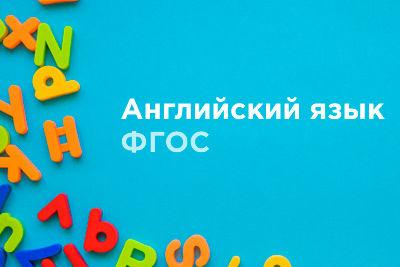


Устанавливая рекомендуемое программное обеспечение вы соглашаетесь
с лицензионным соглашением Яндекс.Браузера и настольного ПО Яндекса .

- Шихова Галина МихайловнаНаписать 6136 02.10.2016
Номер материала: ДБ-229840
Устанавливая рекомендуемое программное обеспечение вы соглашаетесь
с лицензионным соглашением Яндекс.Браузера и настольного ПО Яндекса .
- 02.10.2016 2428
- 02.10.2016 393
- 02.10.2016 1106
- 02.10.2016 359
- 02.10.2016 372
- 02.10.2016 524
- 02.10.2016 370
Не нашли то что искали?
Вам будут интересны эти курсы:





Ответственность за разрешение любых спорных моментов, касающихся самих материалов и их содержания, берут на себя пользователи, разместившие материал на сайте. Однако редакция сайта готова оказать всяческую поддержку в решении любых вопросов связанных с работой и содержанием сайта. Если Вы заметили, что на данном сайте незаконно используются материалы, сообщите об этом администрации сайта через форму обратной связи.



